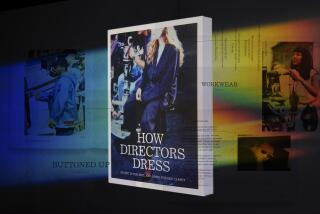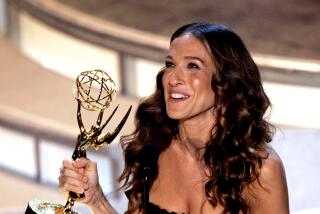Heidi Fleiss: Hollywood’s Woman of the Year? : Entertainment: In a world where actresses over 40 have trouble getting jobs and women directors are few, some see the alleged madam’s success as a mirror on industry inequities.
For women in the entertainment industry, it is the ultimate irony: that Hollywood’s ballyhooed Year of the Woman has been followed by the Summer of Heidi.
“That’s certainly the topper,” one female screenwriter says sarcastically, echoing a popular complaint in a town where substantial women’s roles are unusual, actresses over 40 have a tough time finding work and women directors are a rare breed.
“It’s somewhat pathetic that a woman in this line of work has probably received more press attention across the board than any other woman I can think of in this business--actress or executive--with many stories to tell and many more achievements,” marvels publicist Jody Frisch.
But for better or worse, 27-year-old accused madam-to-the-stars Heidi Fleiss is at the center of a media storm. Her lawyer even hired her a publicist over the weekend.
“This woman is getting amazing attention,” Frisch says, “and will probably have three made-for-TV movies on her.”
But even if Heidi is the biggest woman’s role of the summer, the other women in Hollywood--whether they’re working in the business, married to someone in it, or both--have an unusual vantage point on the scandal. They remain uniquely unscathed: There are no female producers or actors--as far as anyone knows--among Fleiss’ alleged clientele. (“It’s good for gays, too,” suggests one female producer. “They’ve been the source of all lifestyle disapproval for so long.”)
Which doesn’t mean women have relished this scandal as some just comeuppance for Hollywood men drunk with power.
“I think this looks bad for all of us,” says television producer Deborah Joy LeVine, who created the upcoming ABC series “Lois and Clark: The New Adventures of Superman.” “There’s middle America looking at Hollywood. They don’t make gender distinctions. They already look at us as a party town.”
To some, this scandal says no more about the status of women in Hollywood than does a prostitution scandal anywhere else.
“This shows something about the status of people in the world,” notes one female studio executive. “We are just fascinated by sex.”
But whether you are fascinated or repulsed by the unfolding drama, it seems inevitable you will have to take a look. “Now, it’s like a car accident,” says another female studio executive.
And here’s what some women see: a mirror on Hollywood’s inequities.
“It’s typical of the male-dominated industry that studio executives would be indulging male stars like this and putting it on production budgets,” muses screenwriter Amy Holden Jones, commenting on the popular--but unproven--rumor. And in the end, notes Jones, it’s the women who get prosecuted. “The women are tarnished,” she says. “The men, oh, they’re just randy men, happy-go-lucky stars. That is grossly unfair.”
Jones and her husband, cinematographer Michael Chapman (“The Fugitive”), have been ensconced in Martha’s Vineyard since early June, part of a summer migration of entertainment folk from this coast to that island. Heidi doesn’t come up over dinner. “One hesitates to bring it up with men in the business, not knowing if it’s going to be a sensitive subject,” Jones quips.
And Jones knows about sensitive subjects. She wrote “Indecent Proposal,” one of the year’s most popular movies and also one of the most criticized, because a character portrayed by Demi Moore consents to sleep with one played by Robert Redford for $1 million. This is not a Heidi-like situation, Jones says. “Demi Moore makes a choice to sleep with Robert Redford. She doesn’t get sold,” says Jones. “It was supposed to be a metaphor about betrayal in a marriage.”
One thing the Heidi scandal doesn’t betray is the traditional image of Hollywood as a trafficker of flesh.
“It’s Hollywood Babylon,” says producer Lynda Obst, on location in upstate California filming a women’s Western called “Bad Girls.” “It gets yuppified and we have A.A., but in some ways it never changes.”
Says one female studio executive who asked not to be named, “The image of the powerful influential man, usually fat and old and smoking a cigar, with a pretty young thing of questionable virtue on his arm, is an image that has been in the industry forever . . . It’s an industry which trades in pretty young things--whether on the screen or as an important accessory.”
But there has been some change in the sexual mores of the boys’ club--according to women with provisional membership in it--and some shift in the moral climate. Which makes this scandal more surprising. “I think the boys’ club is more conservative and more concerned about power than sex,” says producer LeVine. “I don’t think any of them would like to be labeled a playboy.”
Of course, some who remember an earlier Hollywood are profoundly underwhelmed.
“I used to get all of Elvis’ dates for him and I never got any money,” deadpans Kitty Jones Lee, 53, a singer and former agent who was close to Elvis Presley in the early ‘60s. “I fixed him up every night for five years. What do you call that?”
“I don’t understand why they have to pay for it in Hollywood,” says Eva Gabor, one of Hollywood’s most famous fixtures. “There are women who would give it away for one line in a movie--or no line in a movie.”
Romps with prostitutes may be old news but the rumors of studio financing are not. “That’s the worst part of it,” says Callie Khouri, who penned the women’s road movie “Thelma & Louise.” “I would feel guilty asking someone to get my car washed.”
And there are some women in Hollywood who insist they are not playing the increasingly popular parlor game of trying to guess whether they share any acquaintances with Fleiss.
“I couldn’t care less--I really mean it,” says Gloria Stewart, the wife of Jimmy Stewart.
More to Read
The biggest entertainment stories
Get our big stories about Hollywood, film, television, music, arts, culture and more right in your inbox as soon as they publish.
You may occasionally receive promotional content from the Los Angeles Times.











